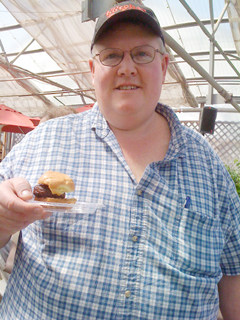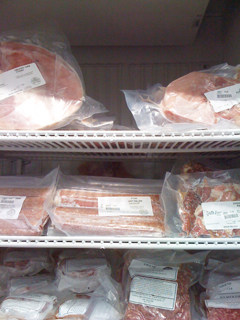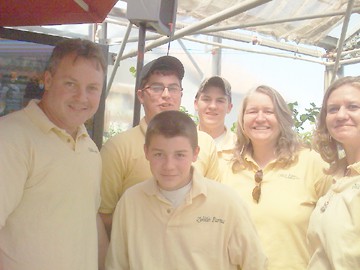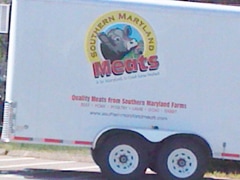The Carnivore’s Conundrum
Growing your own veggies is one thing; raising your own livestock is entirely another.
That’s the lesson of my friends’ rabbits.
Back when Earth Day was a bright new idea, green pioneers Janice and Phil turned their mildly urban garage into a high-rise rabbit warren. Chemical-intensive factory farming had scared the health-minded couple away from grocery meat. Home-raised rabbit seemed the sustainable solution.
For one reason or another, not one of their rabbits ever made it to the table. Instead of dining on succulent rabbit ragout, my friends eschewed meat for almost ever after.
The Local Connection
Cattle ranchers Allen Colhoun of Ivy Neck Farm and Willie Godard of St. Mary’s County. |
Nowadays, the meat lovers among us have more choices.
Just in time for Earth Day 2011, the Southern Maryland Meats Program links us with local farmers who raise meat — so we don’t have to do it ourselves — and merchants who sell it.
“Until now, it has been extraordinarily difficult to purchase local meat,” said Christine Bergmark, executive director of the Southern Maryland Agricultural Development Commission. “Consumers buying directly from the farm had to buy the whole cow, not just the steak.”
The new meat program — part of a larger effort in support of Southern Maryland agriculture — brings locally raised meat beyond the farm and farmers’ markets into the stream of local commerce.
The goal is to increase the supply by increasing demand. With ready markets, more meat-raisers are likely to move out of the mainstream and to selling directly to you.
“I think we can double the value of our animal,” St. Mary’s County beef grower Willie Godard told Bay Weekly. That’s why he’s considering moving from the standard livestock market to the more demanding Southern Maryland Meats Program.
With two growers now selling through the program, meat eaters can shop close to home for steak, hamburger, roasts, even oxtails raised by farmers close to home — in Anne Arundel, Calvert, Charles, Prince Georges, and St. Mary’s counties.
Beyond beef, we can choose lamb, pork, chicken, rabbit and goat, all raised by on Zekiah Farm by the extended Thorne family and young 4-H farmers.
 Mike Smollon of My Butcher and More. |
Anne Arundel, the first county where the Southern Maryland Meats Program is being marketed, has three locations:
Mike Smollon’s My Butcher and More in Clocktower Plaza on Forest Drive, Annapolis.
Homestead Gardens on Route 214 at 424 in Davidsonville.
Homestead pioneered its new line at Thanksgiving, selling fresh, never-frozen organic turkeys raised in Pennsylvania. Now garden shoppers can also stock up on meat from a full line of cuts raised in Anne Arundel County, at Ivy Neck Farm, as well as Zechiah Farm in Charles County.
The Anne Arundel County Farmers’ Market on Harry Truman Parkway at Riva Road.

At each location, the meat is sold from an upright freezer display paid for by the Southern Maryland Meats Program. Under the program, each of the five Southern Maryland counties gets two display cases — hence two local outlets. Farmers in the program get the use of a freezer truck to carry their cuts from the slaughterhouse, where it’s butchered, packaged in sealed, clear plastic and flash-frozen.
Meat You Can Trust
Meat registered with the new program overcomes many of the objections that turned my friends vegetarian.
It’s sustainably raised, with no feed made from animal by-products or growth hormones or antibiotics.
At conventional stores, “it’s like rolling the dice,” says Zekiah farmer David Thorne. “You never know what’s gone into the meat you’re eating. With us, you get trust. You can come to the farm, see our animals, and we’ll answer all your questions — including how they’ve been fed.”
Zekiah meat is fed on pasture hay and grain. The feed is locally, but not organically, grown. The other producer now in the program, Allen Colhoun of Ivy Neck Farm in Southern Anne Arundel County, feeds his cattle only on grass.
 The Zekiah family farmers: David Thorne, Cody Thorne (front), Brent Bucci, Tyler Thorne, Cindy Thorne and Jen Richard. |

Meat registered with the new program is humanely raised on a small scale, with other animals in open pastures — not confined in factory farms. “The happier the animal, the better their meat,” says young Zekiah 4-H farmer Bret Bucci. “All of our animals are hands-on, with brushing and washing every single day”.
Meat registered with the new program is locally grown, by people who are your neighbors. That, says butcher Mike Smollon, is a big part of the reason that 80 percent of the meat he sells at My Butcher is local. “I made the decision when the farmer from St. Brigid’s Farm in Kennedyville drove up in his pickup truck with his frozen meat in a cooler. He’d been working all day in the field, and now he was doing his delivery. It came to me straight from the source, and I could talk to him.”
Meat registered with the new program is minimally transported, in small trucks or vans, from farm to slaughterhouse and back. With a lower carbon footprint, it’s better for the environment as well as for you.
Meat registered with the new program is clearly labeled, meaning you have access to clear, consistent and accurate information about how the animal was raised and fed. You can read all the standards at www.southernmarylandmeats.com.
If you have a taste for meat, here’s a way to satisfy it sustainably while bolstering local farmers. You can even buy rabbit, already dispatched and dressed, at My Butcher.
